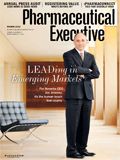Betting on Bigger Data
In the rush to collect as much patient data as possible, are we sacrificing quality for quantity? Ben Comer reports.
In a fictional piece translated as "On Exactitude in Science," the author Jorge Luis Borges writes of a society so obsessed with the "art of cartography" that it constructs a map of ever-increasing size and detail, until one day the map grows so large as to "coincide point for point" with the landscape, covering everything. In the story, future generations "saw that the vast map was useless," and left it to decay under the sun and rain. Tattered ruins of the map still remain, "inhabited by animals and beggars."

Ben Comer
Borges' piece was published in 1946, when maps were printed on paper. Today, no one would argue that a Google map, with its street-view specificity, is without use. Computers—and now more recently the 'cloud'—solved one of the fundamental problems related to quantities of information: the limitations of physical space. Even so, the data is piling up, much faster than it can be parsed. Why?
Computers can't yet relate to human beings in the way that we know and understand each other, because computers can't recognize natural languages semantically. Put another way, language is eminently, irreversibly human; it's illogical, imprecise, and fraught with subtext. For computers, it doesn't compute. "No one is too concerned with exactly how much hair a man has to lose before he is bald. If he looks bald, he is," wrote David Auerbach, a software engineer, in a recent article for the journal n+1 titled, "The Stupidity of Computers." Computers can only model systems that are governed by precise logic; friendship and education, for example, are elusive, as "You Are Not a Gadget" author Jaron Lanier has written. But what about health?
At the ePharma Summit last month, Kevin Kelly, author and founding executive editor of Wired magazine, regaled attendees with news of the growing "life-logger" movement—people who use sensors and other technologies to collect data about themselves. Kelly's organization, Quantified Self, supports the life-logger mission of collecting ever-more-encompassing data on as many aspects of her/himself as possible, from bodily functions such as heart rate and caloric intake, to self-reported inputs on mood and stress levels. New and improved sensors and analytical tools are being developed constantly. The goal, according to Kelly, is the achievement of 24/7 real-time data analytics representing as many aspects of a person as possible—to be shared, of course.
The benefit to health outcomes that such self-surveillance could supply is undeniable. For example, biological irregularities would become apparent earlier, leading to faster medical intervention. Once insurers tie coverage decisions to your Fitbit Ultra pocket sensor, though, your benefit might get pretty expensive. Forget preexisting conditions and start worrying about blame-based disease states; your diet may get sent to the payer in pie-chart form. Too alarmist? For the larger picture, consider Borges' parable. In an attempt to map ourselves in our quantitative entireties, will we come up with anything more meaningful than a paper doll? "Information is alienated experience," writes Lanier. Experience itself is something else. The problem with the data-driven life of the loggers is that the resulting analytical picture looks more like a Polaroid than a hologram. Our charts may coincide point for point with our physical profile, but it's a mistake to think that a self, or one's health, can be compressed into a database, in the way that an orchestral performance can be compressed into an MP3. Ethnographers understand that health is not simply a combination of measurable biological processes and a genetic profile. There are qualitative factors—psychological, environmental, and spiritual—that resist statistical analysis. Yes, there's a popular app for happiness assessment (Mood Panda), but how much about my mental health is gleaned, scientifically, by quantifying my mood on a numeric scale between frowny face and smiley face emoticons?
"The most important thing to ask about any technology is how it changes people," writes Lanier. "I fear that we are beginning to design ourselves to suit digital models of us, and I worry about a leaching of empathy and humanity in that process." In the quest for bigger and bigger databases and statistical maps, the life sciences industry needs to remember what makes people unique and interesting: our anomalous behavior and weirdness in general. Don't let the quality of the human enterprise get lost in the race toward quantification.

Trump: 'Major Tariff' on Pharmaceuticals Coming Soon
Published: April 9th 2025 | Updated: April 9th 2025“We’re going to tariff our pharmaceuticals, and once we do that, they are going to come rushing back into our country," President Donald J. Trump said during a Tuesday night dinner in Washington.
ROI and Rare Disease: Retooling the ‘Gene’ Value Machine
November 14th 2024Framework proposes three strategies designed to address the unique challenges of personalized and genetic therapies for rare diseases—and increase the probability of economic success for a new wave of potential curative treatments for these conditions.